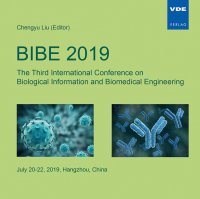Phylogenetic analysis of tomato varieties based on combined DNA markers
Konferenz: BIBE 2019 - The Third International Conference on Biological Information and Biomedical Engineering
20.06.2019 - 22.06.2019 in Hangzhou, China
Tagungsband: BIBE 2019
Seiten: 4Sprache: EnglischTyp: PDF
Persönliche VDE-Mitglieder erhalten auf diesen Artikel 10% Rabatt
Autoren:
Luo, Jun; Liu, Yu-Jing; Deng, Han-Wen; Liu, Lin-De; Sun, Yan-Lin (School of Life Sciences, Ludong University, Yantai, China)
Inhalt:
More than 500 varieties of tomato (Somanum lycopersicum L.) have been hybridized naturally or artificially bred. Due to exhibiting different traits of every variety, efficient variety identification seems to be very important for further purposive and functional breeding. In this study, we attempted to distinguish 26 different tomato representative varieties by DNA profiling. Our previous studies had analyzed the genetic variations of the rRNA 5S, nrDNA ITS, and cpDNA rbcL gene sequences among these 26 tomato varieties. In this study, we added to analyze the sequence variation of 18S rDNA region and expected to replenish their phylogenetic relationship on the basis of previous studies. As a result of different focal points of each DNA barcode analysis, simplex analysis result of the DNA barcode might ignore some characteristics on certain materials, and accordingly impacted on the final result of phylogenetic relationship. The phylogenetic relationship would be further revised and ameliorated again when used multiform DNA barcodes. Our result suggested that the 18S gene could help to accurately discriminate tomato variety Campari with other varieties, and the participation of the 18S sequences made their phylogenetic relationship more accurate and more realistic.


